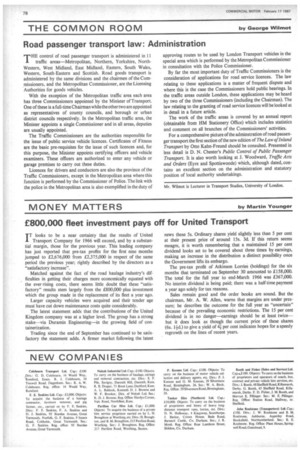Road passenger transport law: Administration
Page 80

If you've noticed an error in this article please click here to report it so we can fix it.
THE control of road passenger transport is administered in 11 traffic areas—Metropolitan, Northern, Yorkshire, NorthWestern, West Midland, East Midland, Eastern, South Wales, Western, South-Eastern and Scottish. Road goods transport is administered by the same divisions and the chairmen of the Commissioners, and the Metropolitan Commissioner, are the Licensing Authorities for goods vehicles.
With the exception of the Metropolitan traffic area each area has three Commissioners appointed by the Minister of Transport. One of these is a full-time Chairman whilethe other two are appointed as representatives of county councils, and borough or urban district councils respectively. In the Metropolitan traffic area, the Minister appoints a single Commissioner and in all areas, deputies are usually appointed.
The Traffic Commissioners are the authorities responsible for the issue of public service vehicle licences. Certificates of Fitness are the basic pre-requisites for the issue of such licences and, for this purpose, the Minister appoints certifying officers and vehicle examiners. These officers are authorized to enter any vehicle or garage premises to carry out these duties.
Licences for drivers and conductors are also the province of the Traffic Commissioners, except in the Metropolitan area where this function is performed by the Commissioner of Police. The link with the police in the Metropolitan area is also exemplified in the duty of approving routes to be used by London Transport vehicles in the special area which is performed by the Metropolitan Commissioner in consultation with the Police Commissioner.
By far the most important duty of Traffic Commissioners is the consideration of applications for road service licences. The law relating to these applications is a matter of frequent dispute and where this is the case the Commissioners hold public hearings. In the traffic areas outside London, these applications may be heard by two of the three Commissioners (including the Chairman). The law relating to the granting of road service licences will be looked at in detail in a future article.
The work of the traffic areas is covered by an annual report (obtainable from HM Stationery Office) which includes statistics and comment on all branches of the Commissioners' activities.
For a comprehensive picture of the adminstration of road passenger transport the first section of the new edition of The Law of Inland Transport by Otto Kahn-Freund should be consulted. Presented in less detail is D. N. Chester's Public Control of Public Passenger Transport. It is also worth looking at J. Woodward, Traffic Acts and Orders (Eyre and Spottiswoode) which, although dated, contains an excellent section on the administration and statutory position of local authority undertakings.




































































































































